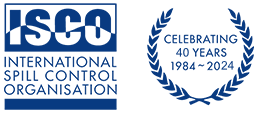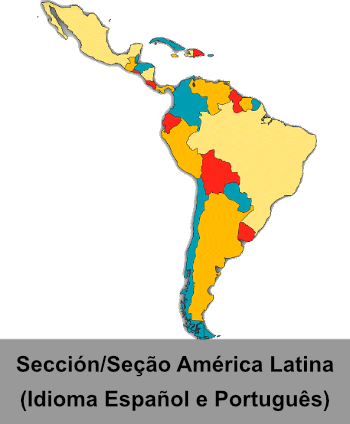PROFESSIONAL RECOGNITION FOR INDIVIDUALS IN THE INTERNATIONAL SPILL RESPONSE COMMUNITY
The International Spill Control Organisation (ISCO) has introduced new classes of professional membership that recognise the qualifications and experience of spill responders and others in the international spill response community.
ISCO President David Usher said “This fills a long felt need and will help meet the aspirations of many in the industry who have long felt that their qualifications and experience should be recognised. The creation of professional memberships will encourage all who are making a career in the field of oil and chemical pollution control to take pride in their chosen profession”.
Students, apprentices and trainees can join ISCO as student members and pursue a career development path that, as qualifications and experience are gained, can lead to eligibility for Associate Membership (AMISCO), Membership (MISCO) and, eventually, Fellowship (FISCO).
All who have the relevant qualifications and the required level of experience can apply for Professional Membership of ISCO. The organization offers independent validation and integrity. Each grade of membership reflects an individual’s professional training, experience and qualifications. Academic qualifications are not a requirement if applicants can demonstrate the necessary levels of competence through their experience, skills and professional development.
The key word is “professional” when applied to men and women who are making a success in their careers and have the necessary levels of knowledge and expertise. Professional recognition is a visible mark of quality, competence and commitment, and can offer a significant advantage in today’s competitive environment.
ISCO is a not-for-profit organisation with members in 40 countries and holds consultative status at IMO. Established in 1984, ISCO’s mission is to raise worldwide preparedness and co-operation in response to oil and chemical spills, to promote technical development and professional competency, and to provide a focus for making the knowledge and experience of spill control professionals available to IMO, UNEP and other organizations.
BACKGROUND TO THE INTRODUCTION OF PROFESSIONAL RECOGNITION
This is a matter that has been deliberated on for many months by a small working group – David Usher, Simon Rickaby, John McMurtrie and Michael Stacey – and discussed in detail at two specially convened meetings.
When the concept was first introduced by Simon Rickaby there were concerns that the implementing of the idea might have an adverse effect on the good standing of ISCO and that awards of Professional Recognitions might not command a proper respect.
A great deal of care has been taken to ensure that this will most certainly not be the case. The procedure for evaluating the suitability of candidates is rigorous as can be seen from the requirements detailed in the Application Form and, as a further safeguard, the Membership Standards Committee will arrange for the conduct of peer interviews in any case where there is doubt concerning the suitability of any candidate for the award being applied for.
What we are offering is Professional Recognition in a profession that traditionally has not required high academic attainment but rather intuition, experience and skills only found by being on the job rather than only from a class room. ISCO has decided to do something about it for the thousands of spill response professionals globally active who until now have not had the opportunity to show their skills and professionalism in a comparable light to lawyers, accountants and engineers.
Professional Recognition is being introduced only after extended discussions within the Executive Committee and consultation with the ISCO Council. For your further information, here is an extract from the letter introducing the initiative to Members of ISCO Council:
INTRODUCTION OF PROFESSIONAL RECOGNITION
Summary of the Proposal made by ISCO Executive Committee member Simon Rickaby –
1. With his background as Past President of the Institute of Marine Engineering, Science and Technology (IMarEST) Simon sees a significant opportunity for ISCO.
2. ISCO has redefined itself as an organisation for those (companies and individuals) that have a professional interest in spill control. One thing that does not at present exist for professionals in the industry is a means of obtaining any formal recognition. IMarEST does provide this for its many thousands of members in the field of marine engineering and it would not be difficult for ISCO to do this. Simon believes there are very large numbers of professionals in the industry who would value an opportunity to gain a formal qualification and become an Associate Member (AMISCO), Member (MISCO) or Fellow (FISCO) of the International Spill Control Organisation.
3. This rings a bell with a long felt belief that people working in the industry should have pride in their chosen profession and be recognised as professionals.
4. In practice, the adoption of Simon’s suggestion is something that ISCO can embark on without incurring major costs, and once underway, will be self-sustaining and make a contribution to ISCO funding.
5. The mechanisms will generally follow those used by IMarEST.
-
A candidate wishing to gain a formal qualification should make application to ISCO, submitting his CV and supplementary information on his qualifications and experience. Note that a university degree or other formal qualifications is not a requirement (but could be taken into consideration). The work experience of candidates is a primary factor.
-
Candidates also have to provide details of a referee who would be a person of recognised standing acceptable to the Membership Standards Committee.
-
Where appropriate, ISCO will arrange for a professional interview of the candidate to be carried out by two trusted referees, preferably resident in the country or region where the candidate lives. Some interviews might be carried out at conference events being attended by relevant parties. Another option is to conduct interviews by Skype conference video link over the internet.
-
The documentation provided by the candidate and a report from the interviewers will be submitted to the Membership Standards Committee, (to ensure professional standards are maintained), This committee will determine level of professional recognition – Associate Member, Professional Member or Fellow. Note that this committee will be able to reach its decisions using email communications.
-
A one-time-only Assessment Fee will be payable in advance before an application can be considered by the Membership Standards Committee.
-
Appropriate certificates will be prepared and issued to successful candidates on payment in advance of an annual fee.
-
Students / apprentices / trainees will start as Student Members. Those with more experience may be recognised as Associate Members, Members or Fellows. The Grade of Fellow will only be available to candidates who have very substantial experience acquired over many years together with a position or level of recognised and significant authority.
-
Professional awards given by ISCO will be announced in the ISCO Newsletter.
-
The existing list of Members in the members’ area of the ISCO website has been modified to reflect awards of professional status.
6. It will thus be possible for Student or Associate Members to progress over time to becoming full Members and eventually Fellows, so setting in place ongoing professional development of individuals, and in turn the industry will benefit. This development can be accommodated within ISCO’s existing structure.
Corporate Members will continue to be Corporate Members and Associate Members have been reclassified as Industry Partners. Existing Individual Members may remain as such or may apply for professional membership and be assessed for the level they wish to apply for. Honorary Members will become Fellows. Existing individual members will be encouraged to apply to be regraded as a Student Member, Associate Member, Member or Fellow as appropriate.
REVISIONS TO CLASSES OF ISCO MEMBERSHIP
The introduction of Professional Memberships has made it necessary to revise the existing classes of membership. Please refer to the page “Classes of Membership” on the website.
Changes will not affect the membership of Corporate Members but it is recommended that Corporate Members consider the advantages of encouraging staff to qualify as Professional Members of the organization to provide a career path and reinforce pride in their profession. The employment of staff that hold recognised qualifications has positive implications for companies that wish to demonstrate that they place a high value on the competency of their personnel. One option is to reward employees by sponsoring their Professional Membership of ISCO.
Existing “Members” (individuals) have been reclassified as “Individual Members” but may, if they wish, apply for Professional Recognition.
Existing “Honorary Members” will become “Honorary Fellows”
Existing “Associate Members” have been reclassified as “Industry Partners”.





